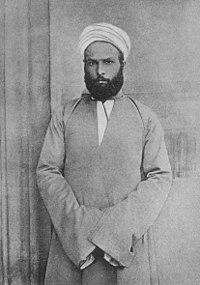Al Azhar University
The Al-Azhar University (Arabic:جامعة الأزهر الشريف; Al-ʾAzhar al-Šarīf) was founded as a Shiite school of theology by the Fatimid Empire in what is now Egypt in 975. It later became a Sunni school, and is considered by most Sunni Muslims to be the most prestigious school.
Features
The university includes among its objectives the propagation of the Islamic religion and culture. To this end, its Islamic scholars (ulama) issue edicts (fatwas) on various disputes throughout the Sunni Islamic world regarding the proper conduct to be observed by Muslim individuals or societies (a recent example is the clarification and hence, the prohibition of female genital mutilation).
Al-Azhar has a religiously inspired curriculum. On the one hand, he pays special attention to the study of the Qur'an and the traditions of the Prophet Muhammad, on the other hand, instead, he teaches all fields of modern science. In 1961 faculties of applied sciences were introduced, such as the faculties of Medicine and Engineering. These faculties combine empirical sciences with religious sciences.
The university is characterized by receiving, in addition to Egyptian students, several thousand foreign students, the vast majority coming from non-Western countries (5,000 in 1998). Foreign Muslim students enjoy the same rights as foreign students. Egyptians.
History
The university (or madrasa) of Al-Azhar was founded in the year 975 by the Fatimid dynasty of Egypt, descendants of Fatima, the youngest daughter of the Prophet Muhammad, known as Az-Zahra ("the shining one"), and the university was named in her honor.
The university originally had faculties of Islamic law (sharia) and jurisprudence (fiqh), Arabic grammar, Islamic astronomy, Islamic philosophy, and logic.
In the 12th century, following the overthrow of the Fatimid (Shia) dynasty in 1171, the Sunni sultan Saladin (the founder of the Ayyubid dynasty) turned Al-Azhar into a center of Sunni learning. In this period, for almost a century, Al-Azhar ceased to function as a university, although studies continued as in previous times, mainly religious and linguistic.
In the Mamluk period (between 1250 and 1517), the university regained its former position and assumed new responsibilities within the Muslim world. As a result of Mongol attacks in Central Asia and the reduction of Muslim rule in Andalusia, Al-Azhar became a haven for Islamic scholars forced to leave their hometowns. The arrival of these intellectuals marked a golden age for Al-Azhar, which reached the height of its glory in the 14th century and XV.
Under Ottoman rule (starting in the 16th century) Al-Azhar was financially independent, supported by donations and, thanks to religious tolerance, scholars were free to choose their fields of study and texts. During the almost three centuries of Ottoman rule, they never imposed an Imam of Turkish origin as head of the university, reserving this honor for the Egyptians. This independence and intellectual tolerance became a sign of its own identity and made Al-Azhar one of the most important references in the Islamic world. In this period the university attracted many teachers and students from all over the Islamic world.
Since 1929 Al-Azhar has published a magazine (now monthly), whose mission is to publicize religious norms, issues related to Islamic literature and Islamic law. It also includes sections on history, biographies, translated texts and news related to the Muslim world.
Faculties
Currently, Al-Azhar University has campuses in Cairo and other Egyptian cities such as Asiut, Zagazig, Tanta, El Mansoura, Shibin el-Kom, Damanhur, Girga, Qina, Aswan, Damietta and Alexandria. Its campuses are divided by gender.
Colleges for Men (Cairo Venue):
- Faculty of Islamic Theology.
- Faculty of Laws and Islamic Jurisprudence.
- School of Arab Language.
- Faculty of Islamic and Arab Studies.
- Faculty of Islamic Prédica.
- School of Education.
- Faculty of Languages and Translation.
- Faculty of Sciences.
- School of Medicine.
- School of Pharmacy.
- Faculty of Dentistry.
- Faculty of Agriculture.
- Faculty of Commerce.
- Faculty of Engineering.
Colleges for women (Cairo campus):
- Faculty of Islamic and Arab Studies.
- Faculty of Humanities.
- Faculty of Sciences.
- School of Medicine.
- Faculty of Commerce.
Characters related to university
- Muhammad Abduh (1849-1905), founder of modern Islamic philosophy.
- Saad Zaghloul (1859-1927), Egyptian politician, Prime Minister of the country in 1924.
- Izzedin al-Qassam (1882-1935), founder and leader of the Palestinian paramilitary organization Black Hand.
- Hasan al-Banna (1906-1949), a founding Egyptian politician of the Muslim Brotherhood.
- Taha Hussein (1889-1973), Egyptian modernist writer.
- Amin al-Husayni (1895-1974), great mufti of Jerusalem between 1921 and 1948, Palestinian nationalist leader and chief Arab ally of the Third Reich.
- Taqiuddin al-Nabhani (1909-1977), Palestinian theologian and Islamic jurist, founder of the Liberation Party.
- Muhammad Ma Jian (1906-1978), Chinese intellectual, translator of the Quran to Chinese.
- Houari Boumédiène (1932-1978), revolutionary and former president of Algeria.
- Ahmed Yasín (1937-2004), Palestinian political leader co-founder of Hamas.
- Abdurrahman Wahid (1940-2009), former President of Indonesia.
- Shire Jama Ahmed, Somali linguist creator of the modern Latin Latino Somali alphabet (in use since 1972).
- Maumoon Abdul Gayoom (1937-), former President of Maldives.
- Yusuf al-Qaradawi (1926-), internationally renowned ulema settled in Qatar and a member of the University's Board of Major Ulemas.
- Ali Gomaa (1952-), great mufti of Egypt.
Contenido relacionado
Polytheism
Prophet
Aten



